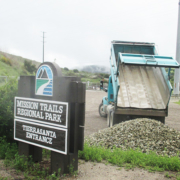Latest Survey of California Snow Pack Measures Below Normal
The last seasonal survey of snow in the Sierra Nevada confirms that California had a dry winter that will leave much-needed runoff levels below normal, authorities said Thursday.
The snow was only 1 ½ inches deep at the traditional manual measuring site at Phillips Station in the range east of Sacramento, and the water contained in it was equivalent to just a half-inch, which is 3 percent of the May average for the location, according to the state Department of Water Resources.
Sierra snow melt typically provides about 30% of the state’s water supply.
More broadly, 130 electronic snow sensors scattered throughout the Sierras indicated that California’s snow pack water equivalent is 37 percent of the May average.
Readings for April also were well below average.
“March and April storms brought needed snow to the Sierras, with the snow pack reaching its peak on April 9, however those gains were not nearly enough to offset a very dry January and February” and the last two weeks of higher temperatures have rapidly reduced the snow pack, said Sean de Guzman, chief of the department’s Snow Survey and Water Supply Forecast Section.
The snow measurements help in predicting runoff into reservoirs that will help meet California’s water demand in the summer and fall, the water agency said.
At the moment, reservoirs are in good shape, with the six largest close to or even above their historical averages. Lake Shasta, California’s largest surface reservoir, is currently more than 80% full, authorities said.




